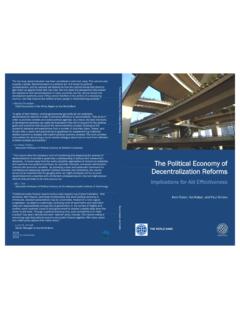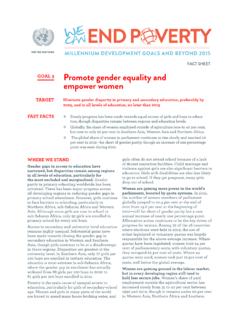Transcription of General Principles for Credit Reporting - World Bank
1 General Principles for Credit Reporting September, 2011 ContentsForeword v1. Introduction and Executive Summary 1 Key Considerations Concerning Credit Reporting and the General Principles 2 Scope and Use of the General Principles 4 Structure of the Report 52. Credit Reporting Systems: Brief Overview and Key Considerations 72 1 The importance of Credit Reporting Systems 72 2 Key Participants in a Credit Reporting System.
2 82 3 Key Considerations Concerning Credit Reporting .. Data .. Data Processing: Security and Efficiency .. Governance Arrangements for Credit Reporting Service Providers and Data Providers and Risk Management .. Legal and Regulatory Framework.. Cross-border Data Flows .. 203. The General Principles 233 1 Public Policy Objectives .. 233 2 The General Principles .. 23 Data .. 23 Data Processing: Security and Efficiency .. 26 Governance and Risk Management .. 28 Legal and Regulatory Environment .. 30 Cross-border Data Flows .. 343 3 The Roles of Credit Reporting System Participants.. 364. Recommendations for Effective Oversight of Credit Reporting Systems 39 Oversight Recommendation A: Regulation and oversight of Credit Reporting systems.
3 39 Oversight Recommendation B: Regulatory and oversight powers and resources .. 40 Oversight Recommendation C: Disclosures of objectives and policies with respect to Credit Reporting systems .. 40 Oversight Recommendation D: Application of the General Principles for Credit Reporting systems .. 41 Oversight Recommendation E: Cooperation among authorities .. 42 General Principles for Credit ReportingivAnnex 1. Information Cycle for the Creation of a Credit Report 45 Annex 2. Basic Existing Models of Credit Reporting Services 49 Annex 3. Privacy, Data Protection and Consumer Protection 53 Annex 4. Select Bibliography 57 Annex 5.
4 Glossary 61 Annex 6. Members of the Task Force 65 Foreword Financial Infrastructure broadly defined comprises the underlying foundation for a country s finan-cial system. It includes all institutions, information, technologies, rules and standards that enable financial intermediation. Poor financial infrastructure in many de-veloping countries poses a considerable constraint upon financial institutions to expand their offering of financial services to underserved segments of the population and the economy. It also creates risks which can threaten the stability of the financial system as a World Bank Group is a leader in financial infra-structure development in emerging markets, including payment systems and remittances, Credit Reporting and secured lending.
5 Moreover, the World Bank Group is intensifying its commitment to promote and dissemi-nate the policy and research debate on these and other topics within the scope of financial infrastructure and also plays the role of international standard setter in this Reporting systems are very important in today s financial system. Creditors consider information held by these systems a primary factor when they evaluate the creditworthiness of data subjects and monitor the Credit circumstances of consumers. This information flow enables Credit markets to function more efficiently and at lower cost than would otherwise be possible. This report describes the nature of Credit Reporting el-ements which are crucial for understanding Credit re-porting and to ensuring that Credit Reporting systems are safe, efficient and reliable.
6 It intends to provide an international agreed framework in the form of inter-national standards for Credit Reporting systems policy and oversight. The Principles for Credit Reporting are deliberately expressed in a General way to ensure that they can be useful in all countries and that they will be durable. These Principles are not intended for use as a blueprint for the design or operation of any specific system, but rather suggest the key characteristics that should be satisfied by different systems and the infra-structure used to support them to achieve a stated com-mon purpose, namely Expanded Access and Coverage, Fair Conditions, and Safe and Efficient Service for bor-rowers and lenders. Against this background, the standards are expected to inform the action of authorities in this field, for ex-ample central banks and banking supervisors in the context of their supervisory function.
7 It is further en-visaged that the standards would be useful to service providers and system operators when designing or modifying their product offerings, to financial interme-diaries when choosing to be a participant in any spe-cific system, and to end users when agreeing to use a specific report has been prepared by a Task Force coordi-nated by the World Bank, with support from the Bank for International Settlements. The Task Force comprises representatives from central banks and other financial and privacy regulators, from multilateral organizations involved in Credit Reporting and from international Credit Reporting service providers. The Task Force also benefited from the significant experience of the Credit Bureau Team of the International Finance Corporation.
8 Some institutions ( Tier 2 Group), although not con- General Principles for Credit Reportingvisidered formally members of the Task Force, have been actively consulted to provide inputs during the process of preparation of the Principles . They include other in-dustry associations, private sector operators, scholars and practitioners. The report was also released for pub-lic World Bank thanks the members of the task force, the reviewers, the Secretariat and its Chairman Massimo Cirasino, for their excellent work in preparing this report. Janamitra Devan, Vice PresidentWorld Bank GroupIntroduction and Executive SummaryWell functioning financial markets contribute to sustainable growth and economic develop-ment, because they typically provide an efficient mechanism for evaluating risk and return to investment, and then managing and allocating risk.
9 Financial infra-structure (FI) is a core part of all financial systems. The quality of financial infrastructure determines the effi-ciency of intermediation, the ability of lenders to evalu-ate risk and of consumers to obtain Credit , insurance and other financial products at competitive terms. Credit re-porting is a vital part of a country s financial infrastruc-ture1 and is an activity of public Credit Reporting addresses a fundamental problem of Credit markets: asymmetric information between borrowers and lenders, which may lead to adverse se-lection, Credit rationing, and moral hazard Regulators and financial market participants are there-fore increasingly recognizing the value of Credit report-ing systems for improved Credit risk and overall Credit portfolio management, to enhance financial supervi-sion and financial sector stability, and as a tool to en-hance access to Credit .
10 3. In competitive markets, the benefits of Credit report-ing activities are passed on to borrowers in the form of a lower cost of capital, which has a positive influence on productive investment Improved information flows also provide the basis for fact-based and quick cred-it assessments, thus facilitating access to Credit and other financial products to a larger number of borrowers with a good Credit history ( good repayment prospects).4. While Credit Reporting systems are developing rapidly across the World , there are no Principles to systemati-cally guide the various stakeholders in dealing with the challenges associated with the development and day-to-day operation and improvement of these systems. The Credit Reporting Standards Setting Task Force was launched by the World Bank, with the support of the Bank for International Settlements, to fill this critical gap, aiming to provide a core set of General Principles to guide these efforts in any given jurisdiction.
















